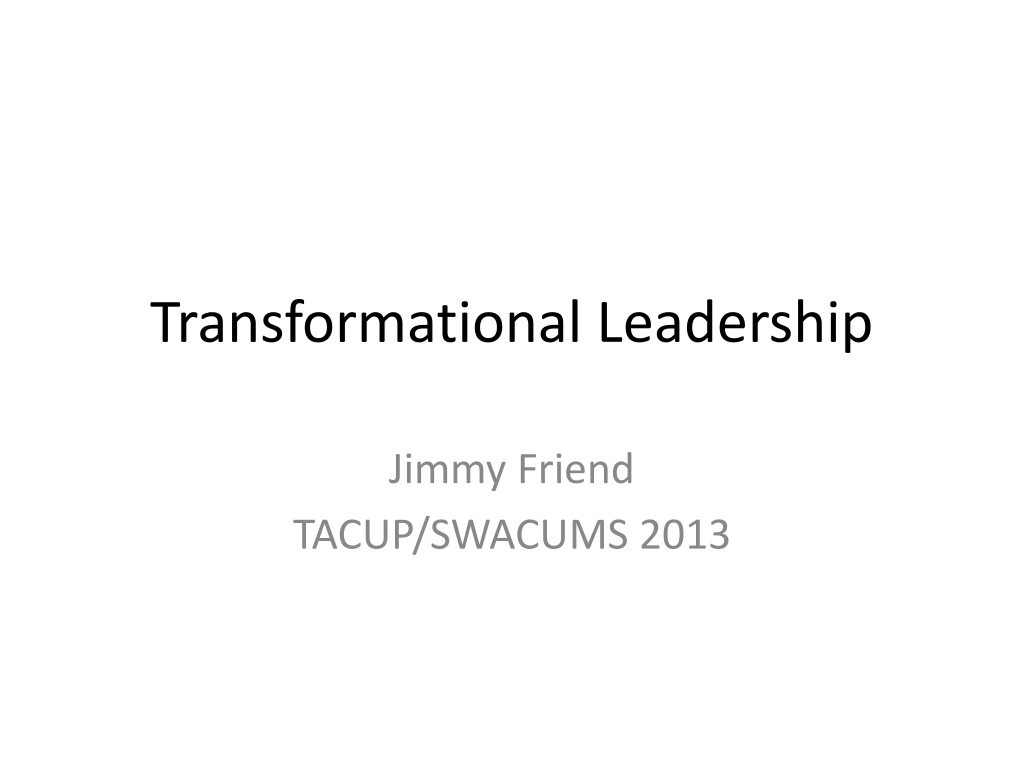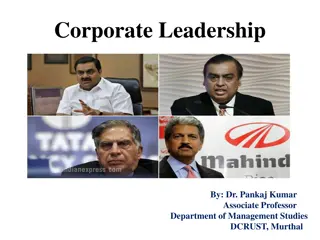Transformational Leadership in Organizations
Transformational leadership is a style that focuses on motivating individuals for the collective good of the organization. It emphasizes raising the integrity and professionalism of followers, shifting focus from self-interest to team goals. Visionary leaders inspire commitment and character development among followers, fostering a strong organizational culture. This leadership approach values ethics, emotions, and shared goals, leading to a positive impact on team dynamics and overall success.
Download Presentation

Please find below an Image/Link to download the presentation.
The content on the website is provided AS IS for your information and personal use only. It may not be sold, licensed, or shared on other websites without obtaining consent from the author.If you encounter any issues during the download, it is possible that the publisher has removed the file from their server.
You are allowed to download the files provided on this website for personal or commercial use, subject to the condition that they are used lawfully. All files are the property of their respective owners.
The content on the website is provided AS IS for your information and personal use only. It may not be sold, licensed, or shared on other websites without obtaining consent from the author.
E N D
Presentation Transcript
Transformational Leadership Jimmy Friend TACUP/SWACUMS 2013
What is Transformation Leadership? Leadership style that encourages motivation simply for the good of the organization Followers are not rewarded individually but are rewarded as a whole, and become more professional and better team players Transformational Leadership raises the character/integrity of the people within the organization
Transformational Leadership James M. Burns 1978 B. M. Bass 1985 Leaders that raise awareness of the significance of team goals Brings change in followers from self interest to team interest Focuses on leaders and followers: Values, Ethics, Goals, Emotions Leaders who are concerned with collective good of the organization
Transformation Leadership Transformational Leaders are normally visionary leaders who seek to appeal to their followers character and commitment Transactional Leaders leaders who motivate followers to achieve goals by mutual exchange Politicians votes for promises Unions promise of better labor contracts Business bonuses for goals achieved
Transformational Leadership Leaders and Followers; the relationship between leaders and followers: One to one Team or group Organizational
Transformation Leadership James M. Burns described transformational leadership at it s best: where leaders and followers; encourage each other to higher levels of motivation Where leaders and followers; motivate each other to higher levels of character and integrity in the work place. B.M. Bass described transformational leadership at it s best: when leaders motivate followers of important goals and visions When leaders and followers transcend self for the sake of the team Address needs of all departments not just their own
Transformational Leadership A transformational leader is : Attentive to need of followers and stresses important goals to the entire department Encourages followers to fulfill potential and to achieve goals, both departmental and personal
Transformational Leadership Examples of Transformational Leaders Ghandi Raised hopes and dreams of million for independence in India Process brought change in followers to use peaceful protests Changed himself through the process
Transformational Leadership Nelson Mandela Committed to a peaceful democracy of South Africa Imprisoned for 27 years but still sought a peaceful reconciliation After independence he continued to seek reconciliation rather than revenge
Transformational Leadership Four Factors that transform followers: Honesty and sincerity Look for leader who is a strong role model Followers identify with honest, sincere, hardworking, dedicated leaders and want to be like them Motivation Leaders are not afraid to communicate expectations Motivate followers to a greater commitment to the vision or goals Use symbols or slogans to motivate followers
Transformational Leadership Challenges/Stimulates ideas Leaders challenge followers to be creative and innovative Leaders challenge followers to challenge the old methods Individualization Leaders listen carefully to individual needs Leaders assist followers in there needs to improve Leaders delegate to help followers grow
Transformational Leadership Opposite of Transformational Leadership: Leader is exploitive, self-consumed, power oriented, low moral values, pursuing more power Leader treats followers in a negative way, which leads to lower production Leader wants followers focused on the leaders self interest Examples: Adolf Hitler, Saddam Hussein
Transformational Leadership Conclusion: Team building is more important than ever as we continue to see threats from FM s and commercial mail and print operations. Reference: Colossians 3:23-24

























